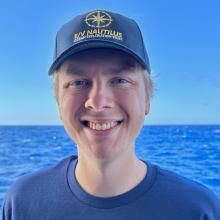
Jacob Stock
Tell us about your work/research. What kinds of things do you do?
My work mainly centers around collecting hydrographic data for the University of South Florida (USF) and supporting their ongoing research at the Center for Ocean Mapping and Innovative Technologies (COMIT). Projects range from uncrewed systems development to backscatter analysis and data processing and visualization. Part of my job consists of developing workflows for these different projects, while other times, I instruct students on multibeam sonar data processing techniques. USF also recently acquired a new vessel, which we will begin outfitting for scientific and survey work in the fall.
What sparked your initial interest in your career?
Growing up on the Gulf Coast of Florida, I always loved the ocean. This connection only grew during my six years in the Navy, where I did multiple tours at sea and traveled to various places. Being on the water brings me a lot of peace, and I knew I wanted to continue working near it after I got out of the service. While at the College of Charleston, I came into contact with the BEnthic Acoustic Mapping and Survey (BEAMS) Program. It was then that I realized pursuing a degree in geology would enable me to further this appreciation for the ocean and continue exploring new places.
Who influenced you or encouraged you the most?
I was lucky in college to work with several great academics as well as various contractors who encouraged me to expand my understanding of hydrography and seek any opportunity that would expand my skill set.
What element of your work/study do you think is the most fascinating?
I enjoy understanding the more technical aspects of the job, such as how acoustics can influence our data quality or how a multibeam system is networked. Experimenting with the software and discovering new and innovative ways to use the technology is a passion of mine. In college, my research focused on developing new methods for using backscatter data to identify deep-sea coral habitats; this continues to be a particular interest of mine.
How did you get involved with the Ocean Exploration Trust?
I became involved with Ocean Exploration Trust through the mapping group at USF. Matthew Hommeyer, their Technical Operations Manager, recommended me and I was invited to participate as a contractor to help strengthen the relationship between COMIT and OET.
What other jobs led you to your current career?
I’ve had many opportunities that led me to work in hydrography. I started in the Navy as a sonar technician, using similar technology to track and localize submarines in the Western Pacific. At the College of Charleston, I used those same skills to help teach students how to operate sonar data processing software. While completing my degree, I worked in the private sector assisting with NOAA contract surveys in Alaska. After graduating in May, I took a position with the University of South Florida.
What are your degrees and certifications?
Bachelor of Arts in Geology -- College of Charleston 2024; Sonar System Operation and Maintenance -- Fleet Anti-Submarine Warfare Training Center 2014
What are your hobbies?
I love sailing, surfing, and just about anything involving the water. I enjoy traveling and trying different foods. When at home, I like to cook different recipes and read. I spend a lot of time with my dog going on walks and exploring different places.
What advice would you give someone who wants to have a career likes yours?
Take every opportunity that comes your way, and focus on building your network. In a small industry, the connections you make can significantly shape your career. Develop a deep understanding of the technology you’ll be using. It's easy to use software at a surface level, but what will truly set you apart is your ability to think critically and solve problems as they arise.
Expeditions
Jacob participated in the following Ocean Exploration Trust expeditions:
